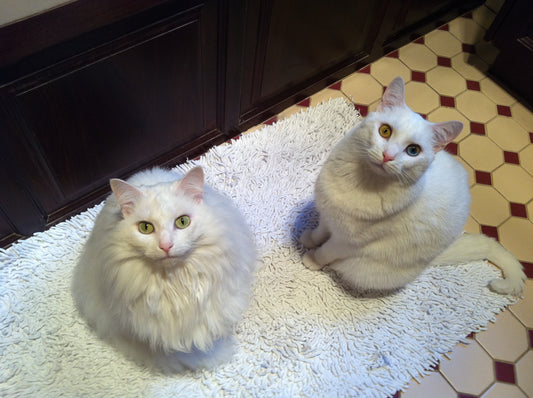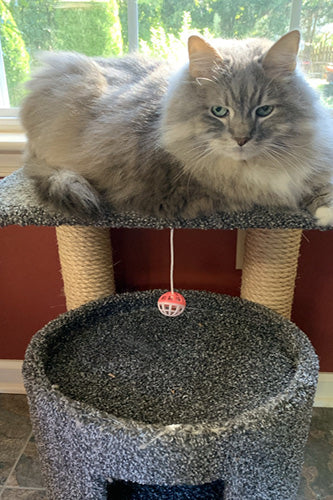Cats spend up to half their day grooming and preening. The sight of your cat grooming themselves has to be up there as one of the most relaxing things to watch…until it’s not.
Sometimes, for a whole host of reasons, your cat will start to overgroom themselves, damaging not only their coat, but injuring their skin and causing themselves stress and anxiety. It’s horrible, but why do they do it, and what can you do to help them?
Reasons your cat might overgroom themselves
Stress
Cats are sensitive souls and changes to their home, routine, or family can quickly cause them to feel stressed and anxious. Overgrooming is a way to self-soothe. A bit like us biting our nails when we are worried.
Allergies
Just like us, cats can suffer from allergies, particularly in springtime when the pollen count is high. Allergies to their food, dust, pollen, or fleas can cause their skin to feel itchy, and in response, they overgroom or scratch themselves raw.
Parasites
Yep. Those pesky fleas, ticks and mites are incredibly irritating to your feline friends, driving them mad with the itch. Even if the fleas are gone, your cat could still react to their saliva, irritating them long after the fleas have left.
Pain
This one is so commonly missed or misunderstood because arthritis in cats is often underdiagnosed. If your cat is repeatedly licking around their joints, it is likely that their suffering from arthritis and they’re desperately trying to soothe the pain. This overgrooming is often localised to the uncomfortable area, like the joint, but can also be across the tummy if it is gastrointestinal pain.
Skin infections
Bacterial or fungal infections (such as ringworm) can cause discomfort and lead to obsessive grooming in cats. These infections might not be obvious to the naked eye but can be incredibly irritating, prompting overgrooming. Always get your cat checked by the vet.
Signs your cat is over-grooming themselves
- Frantic licking or chewing of their fur and skin
- Thinning fur
- Bald patches
- Red inflamed skin
- Sores or scabs
4 ways to help your overgrooming cat
1. Visit the Vet
The first step is to rule out any medical causes. Your vet can check for allergies, infections, parasites, or pain-related issues. They may recommend tests, such as skin scrapings or allergy tests, to pinpoint the problem.
2. Manage stress
Cats are easily stressed, but there is plenty you can do to help them relax.
- Stick to a routine: Cats thrive on routine, so try to stick to predictable times to play, feed and relax with them
- Give them a safe quiet spot: Homelife can be overwhelming, particularly if you’ve got kids or like to entertain. Give your cat a cosy, quiet spot where they know they can safely retreat for some peace.
- Use calming aids: Pheromone diffusers and sprays release synthetic versions of the pheromones your cat would naturally release when they’re happy or relaxed, helping to reduce their feelings of anxiety. You could also consider cat-specific aromatherapy, but ensure these are specially formulated for cats, as many oils are toxic.
- Relocate their bowls and litter: Is your cat’s bowl in the corner of the room, or by a wall? And is their food right next to their water? Yep? It’s so convenient for us not to be tripping over things, and it makes sense to put the bowls together, but actually cats HATE it. They like their food to be in a different location to their water as they wouldn’t eat by their water source in the wild. And they prefer their bowls to be somewhere where they have a good view of their surroundings, as facing a wall or being in a corner can make them feel vulnerable to attack. Try putting them on a window ledge or up on a table. It’s also important to have enough bowls and litter trays, ideally one more than your number of cats, so there is never a fight. Keep litter trays somewhere quiet, but where they can easily see what's coming, and cats can’t sneak up on them.
3. Manage allergies
If you think allergies are causing your cat problems, first, you’ll need to identify what they are allergic to and then try to remove or reduce that allergen in your home. Perhaps switch diet if it’s a food allergy. Regularly wash their bedding and perhaps use an air purifier, particularly during spring when there are more environmental allergens about. And keep up with your cat’s flea treatments.
4. Treat Pain
Cats are masters at hiding pain, particularly arthritic pain, but overgrooming is a very common indicator of discomfort as they try to soothe their joints. Speak to your vet about medication and give them a clinically proven joint supplement like Antinol to support their long-term joint health.
How Antinol® Plus supports overgrooming cats
If your cat is overgrooming, there is likely to be a cause relating to inflammation. That could be inflammation caused by over grooming itself, an allergy or infection, or even the arthritic joints underneath. It’s important to give your cat a supplement that supports their skin health and helps address any underlying issues such as inflammation. That’s where Antinol® comes in.
Antinol® is a powerful, natural anti-inflammatory, soothing angry, inflamed skin and supporting any issues coming from your cat’s joints. The scientifically proven blend of fatty acids helps to strengthen the skin barrier, building protection against the outside world and maintaining strong, healthy skin and a super shiny coat.
For over grooming cats Antinol® Plus will:
- Strengthen the skin cell walls, reducing water loss and maintaining the health of the skin, for protection against the irritants and for a stronger barrier if your cat is compelled to lick.
- Reduce inflammation if your cat’s condition is causing red inflamed skin, or help prevent inflammation if they are frantically grooming themselves.
- Maintain a healthy coat and encourage hair regrowth by maintaining healthy hair pores, for a shiny, strong coat and less shedding.
Overgrooming is no fun for anyone. It’s stressful and potentially painful for your cat, and it’s distressing for you to watch and worry about. Hopefully some of these tips will help your cat find some comfort and calm, for healthy skin and a shiny coat.









